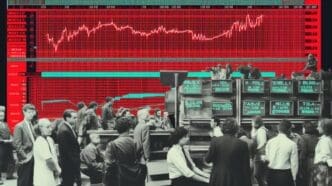New York, NY – Stock futures experienced a downturn on Monday evening as investors closely monitored escalating tensions between Israel and Iran. The Dow Jones Industrial Average futures fell by 199 points, or nearly 0.5%, while S&P 500 futures and Nasdaq 100 futures dipped by 0.5% and 0.6% respectively.
The market's decline followed a post by President Donald Trump on Truth Social, advising for an immediate evacuation of Tehran. This announcement led to a further drop in U.S. stock futures and an increase in West Texas Intermediate crude futures by approximately 2% during overnight trading.
Despite these developments, the major indexes closed Monday's regular trading positively. The Dow added over 300 points, the S&P 500 advanced by around 0.9%, and the Nasdaq Composite gained 1.5%. This uptick was attributed to the cooling of oil prices, with both Brent crude and West Texas Intermediate futures settling over 1% lower. This marked a reversal from the previous surge in oil prices following Israel's airstrikes on Iran.
As the conflict entered its fourth day, Iran reportedly reached out to several countries, including Saudi Arabia and Qatar, to pressure President Trump for a ceasefire, which would be traded for Iran’s flexibility in nuclear negotiations. "The main short-term objective for Israel is to neutralize the Iranian nuclear threat. Longer-term goals, like regime change, are more challenging," Jeff Buchbinder, chief equity strategist at LPL Financial, commented. He noted that historically, stocks have shown resilience during geopolitical shocks, with average drawdowns of 4.6% over about 19 days.
Investors are also eyeing upcoming economic indicators, with May's retail sales data being released on Tuesday and the Federal Reserve's rate policy decision expected on Wednesday. Current trade data from CME's FedWatch tool indicates a strong likelihood that the Federal Reserve will maintain its current target rate range of 4.25% to 4.50%.
Meanwhile, financial experts expressed concerns about the broader economic impact of President Trump's tariffs. Brent Schutte of Northwestern Mutual Wealth Management cautioned against dismissing the potential risks associated with tariffs, noting their pivotal role in the administration's strategy to reshape the global economy and enhance U.S. manufacturing.
The ongoing geopolitical and economic developments continue to shape investor sentiment as markets react to policy changes and international tensions.














